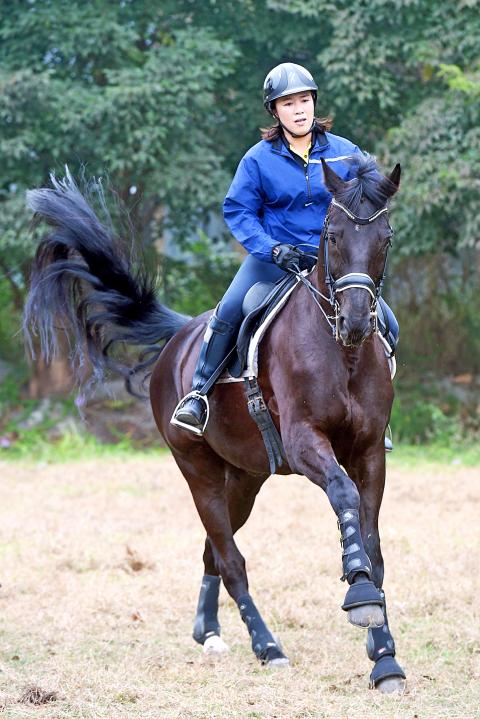Taiwanese rider Yeh Hsiu-hua (葉繡華) is to launch the nation’s first equestrian sports training center in Kaohsiung’s Dashe District (大社) next month, with plans to admit eight trainees and organize the first international equestrian event to be hosted by Taiwan, she said on Thursday.
Yeh, 42, said that Kaohsiung, her hometown, is appropriate for raising horses and training riders due to its weather.
Riders would be trained free of charge and would represent the nation at international events, Yeh said.

Photo: Chang Chung-yi, Taipei Times
Horseback riding has long been regarded as an upper-class pastime, and is the only sport at the Olympic Games to still use animals, she said.
She first rode a horse when she was in elementary school, but did not devote herself to competitive equestrianism until she was in college, Yeh said.
She left for Germany to learn about horse training when she was 22, Yeh said, adding that by the age of 25, she had begun making a name for herself in competitions in Taiwan and abroad.
Yeh won bronze at the 2014 Asia Games in Incheon, South Korea, and won gold at Taiwan’s National Sports Games in 2015.
Since then, she has been running horse ranches in Taoyuan and Tainan, as well as training students, most of whom have also fared well in foreign and domestic competitions.
She did not come from a rich family and has accomplished her goals through hard work and practice, Yeh added.
Most of the horses used competitively in Taiwan are imported from Europe, so they need blood tests to ensure they meet disease control and prevention standards, Yeh said.
All horses are placed under observation for three months, even after the blood tests have been concluded and the horses have passed customs, she added.
The construction of the training center is nearing its final stages, Yeh said, adding that the sand for the pens and training boxes has been imported to ensure that the horses remain unharmed during training.

The manufacture of the remaining 28 M1A2T Abrams tanks Taiwan purchased from the US has recently been completed, and they are expected to be delivered within the next one to two months, a source said yesterday. The Ministry of National Defense is arranging cargo ships to transport the tanks to Taiwan as soon as possible, said the source, who is familiar with the matter. The estimated arrival time ranges from late this month to early next month, the source said. The 28 Abrams tanks make up the third and final batch of a total of 108 tanks, valued at about NT$40.5 billion

Two Taiwanese prosecutors were questioned by Chinese security personnel at their hotel during a trip to China’s Henan Province this month, the Mainland Affairs Council (MAC) said yesterday. The officers had personal information on the prosecutors, including “when they were assigned to their posts, their work locations and job titles,” MAC Deputy Minister and spokesman Liang Wen-chieh (梁文傑) said. On top of asking about their agencies and positions, the officers also questioned the prosecutors about the Cross-Strait Joint Crime-Fighting and Judicial Mutual Assistance Agreement, a pact that serves as the framework for Taiwan-China cooperation on combating crime and providing judicial assistance, Liang

A group from the Taiwanese Designers in Australia association yesterday represented Taiwan at the Midsumma Pride March in Melbourne. The march, held in the St. Kilda suburb, is the city’s largest LGBTQIA+ parade and the flagship event of the annual Midsumma Festival. It attracted more than 45,000 spectators who supported the 400 groups and 10,000 marchers that participated this year, the association said. Taiwanese Designers said they organized a team to march for Taiwan this year, joining politicians, government agencies, professionals and community organizations in showing support for LGBTQIA+ people and diverse communities. As the first country in Asia to legalize same-sex

MOTIVES QUESTIONED The PLA considers Xi’s policies toward Taiwan to be driven by personal considerations rather than military assessment, the Epoch Times reports Chinese President Xi Jinping’s (習近平) latest purge of the Chinese People’s Liberation Army (PLA) leadership might have been prompted by the military’s opposition to plans of invading Taiwan, the Epoch Times said. The Chinese military opposes waging war against Taiwan by a large consensus, putting it at odds with Xi’s vision, the Falun Gong-affiliated daily said in a report on Thursday, citing anonymous sources with insight into the PLA’s inner workings. The opposition is not the opinion of a few generals, but a widely shared view among the PLA cadre, the Epoch Times cited them as saying. “Chinese forces know full well that